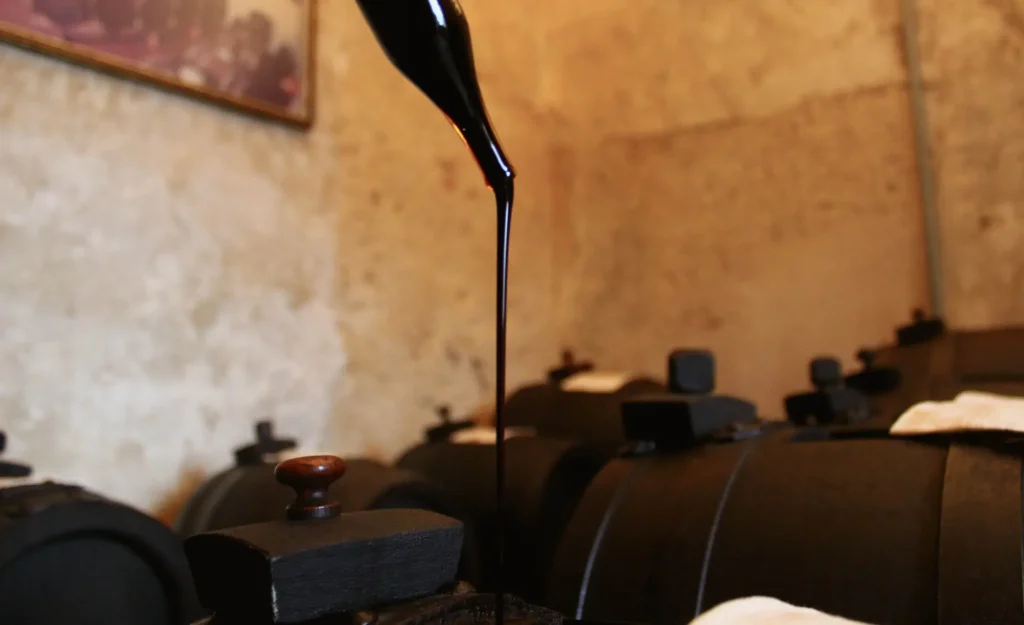Balsamic Vinegar of Modena is a fine condiment, famous throughout the world for its rich and complex flavor. In addition to improving dishes, it offers interesting health benefits to those who consume it. One of the main doubts, however, is linked to its sugar content, which may cause some fear of use in diabetic subjects. Without claiming to replace the advice of a healthcare professional such as a doctor or a nutritionist, we would like to explain in a simple way how Balsamic Vinegar of Modena is an excellent condiment also for those suffering from problems related to diabetes.*
First of All, What is Balsamic Vinegar of Modena?
Balsamic Vinegar of Modena is a traditional, all-Italian product, obtained from the fermentation of cooked grape must and followed by a long period of aging in wooden barrels. This process gives it its characteristic sweet and acidic taste, ideal for enhancing a wide range of dishes. The production process requires passion, time and attention: the must which is cooked slowly for hours until it reaches the desired consistency and subsequently aged in different wooden barrels for a minimum of 12 years in order to obtain the Traditional Balsamic Vinegar of Modena DOP.
Read also: How to choose the right balsamic vinegar to buy?

Benefits of Balsamic Vinegar of Modena for Diabetics
- Blood Sugar Control
One of the main benefits of Balsamic Vinegar of Modena for people suffering from diabetes is its ability to help control blood sugar levels. Several studies have shown that vinegar improves sensitivity to insulin, a hormone essential for the regulation of blood sugar: “the mechanisms through which vinegar interferes with the trend of post-prandial blood sugar are not entirely known. It is believed however, acetic acid (ed. of which Balsamic Vinegar of Modena is rich) can act by suppressing the activities of sucrase, lactase and maltase, a property not shared by other organic acids such as succinic, citric or lactic acid. “ - Low Glycemic Index
Balsamic Vinegar of Modena has a low glycemic index, meaning it does not cause rapid spikes in blood sugar levels. This makes it a safe condiment for diabetics, who must carefully monitor their blood sugar to avoid complications. Furthermore, thanks to its intense flavour, it is possible to use it in small quantities, without compromising the flavor of the dishes. - Rich in Antioxidants
Balsamic Vinegar of Modena is rich in antioxidants and especially polyphenols, which actively reduce inflammation present in the body and improve general health. Antioxidants also fight free radicals in the body, reducing the risk of chronic disease and promoting healthy aging. Polyphenols are also known to have beneficial effects on the cardiovascular system, an important aspect to consider since diabetics are more at risk of developing heart disease. - Effects on Appetite
A last, but no less important benefit of Balsamic Vinegar of Modena is its effect on appetite control. In fact, it seems that acetic acid increases the feeling of satiety, thus helping to reduce overall caloric intake, an absolutely useful factor for diabetics trying to manage their weight. The latter, in fact, proves to be a key factor in controlling blood sugar levels and preventing diabetic complications.

Don’t Give up the Pleasure of a Healthy Condiment
Balsamic Vinegar of Modena is an excellent addition to anyone’s diet, even those suffering from diabetes. Thanks to its beneficial properties, in fact, it contributes to more effective blood sugar management, while improving the taste of your daily dishes. The important thing, as in everything, is to use it in moderation and within a balanced diet.
*The information disseminated on the Site is aimed at adults and in good health. The information reported on the Site, in the various articles, in the contents, in any responses to comments, are for informational purposes only and have in no way the claim or objective of replacing the opinion of the doctor and/or specialist, or other healthcare professional who must in any case be contacted for the formulation of a diagnosis or the indication of a possible correct dietary and/or food supplementation program, and more generally for discussion on the aforementioned information.

















